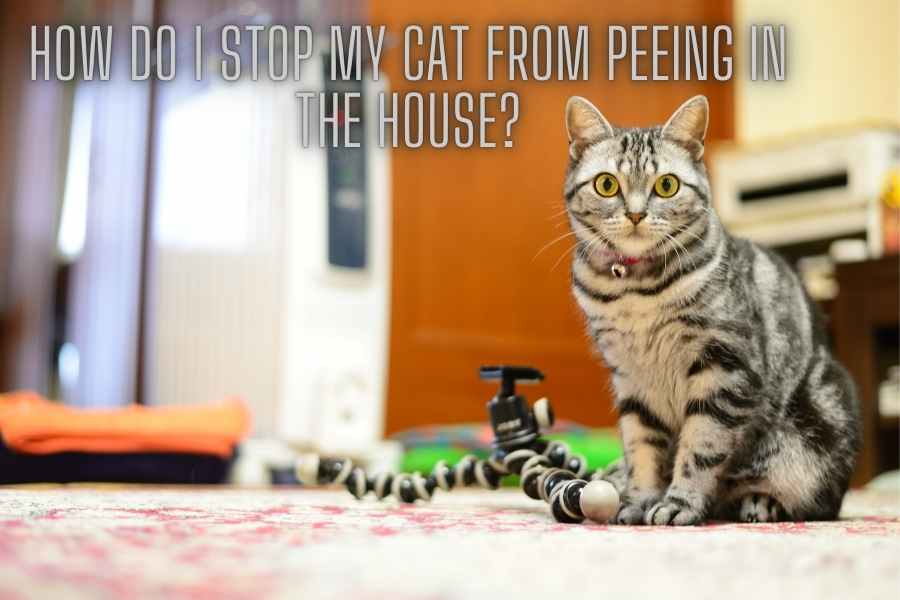Is your whole house smelling like cat urine? Do you always wonder, “How do I stop my cat from peeing in the house?” Well, you’re in the right place. We’ll cover everything you might want to know about stopping cats from peeing in random places in your house.
Pet cat owners must first understand the root of the problem in order to find a solution to the cat pee issue at home. Cats typically urinate inappropriately both inside and outside the home when they are dealing with a health or behavioral issue.
For instance, a cat may find it difficult to control themselves for more than a few seconds if they have a lower urinary tract infection (F.L.U.T.D.), diabetes, or arthritis.
While illnesses cause physical discomfort and pain, anxiety or stress disorders cause the cat to spray (urine mark) around the house, turning your home into one large litter box.
Common stressful situations for your cat include radical changes in routine, type of litter or litter box, a dirty litter box, a few litter boxes, or feeling threatened by a new pet, family member, stray animal, etc.
Other times, seemingly “minor” home improvements like furniture movements, redecorating, or relocating to a new home can severely impact your cat’s ability to move around the house and track down the litter box.
Your cat identifies places it likes to visit most easily thanks to scent marking, which happens when the cat rubs against objects like chairs or doors or scratches other surfaces. Eliminating this smell could create confusion for the cat.
Below, we explain some of the main reasons why your cat is urinating inappropriately and what you can do to fix the problem.
How To Get Cat Poop Smell On Carpets
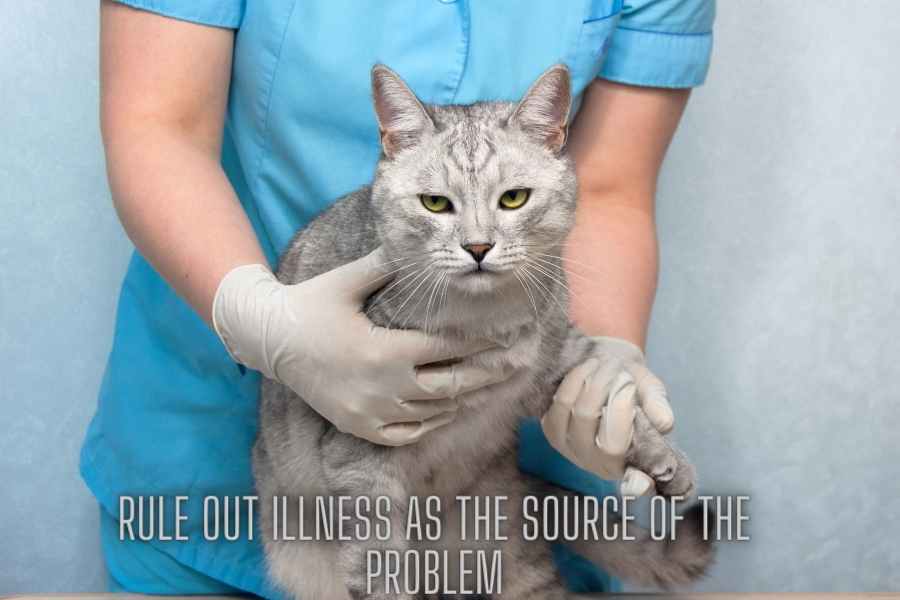
Why Has My Cat Started Peeing In The House?
Step #1: Rule Out Illness As The Source Of The Problem
It is helpful to start by eliminating bladder infections (and related illnesses) as the cause of your cat’s inappropriate urination before moving on. We advise consulting a professional, such as your cat’s vet, for assistance.
You will not only solve the pee issue but also ease any pain or discomfort your cat may be feeling and prevent the development of potentially fatal conditions.
Here are some things to keep in mind and some things you can do to help your cat if you notice any of the symptoms of an illness that may be causing urinary incontinence.
Urinary Tract Infection (U.T.I.)
A common bacterial infection called urethritis (U.T.I.) can inflame a cat’s bladder or urethra. Due to the illness, the cat urinates more frequently because it becomes incredibly hard for it to hold back even small amounts of urine.
If your cat has U.T.I., you may notice that it struggles to urinate and whines when attempting to urinate. In other cases, there is no vocalization, and in dire situations, there is no urine at all. Look out for blood stains in your cat’s urine as well.
In a household with multiple cats, the sick cat prefers to spend most of the time alone, hiding in a corner to avoid disturbance. It’s also important to remember that female cats are more susceptible to UTIs.
Feline Idiopathic Cystisis (FIC)
Feline Idiopathic Cystisis is another common stress-related illness that causes inflammation of your cat’s bladder. Cats struggling with FIC are likely to urinate outside their litter box.
FIC causes the build-up of urine between the cat’s bladder and the tissues, which gives the cat a burning sensation and an urgent desire to relieve itself immediately. According to experts, even a small amount of urine is extraordinarily problematic for your cat.
“Feline Idiopathic Cystisis is treatable; however, it can be fatal if it blocks the urethra and stops the cat from peeing properly.’’ –Victoria Birch, a veterinary nurse.
Other Illnesses
Inappropriate urination in cats can also be brought on by bladder stones or tumors located close to the cat’s bladder neck. For instance, bladder stones make it difficult for a cat to urinate because they prevent the normal flow of urine.
Many diabetic cats experience pain and strain when using the litter box. This is the main cause of litter box aversion, as the cat begins to associate the pain it feels with using the litter box. Furthermore, cats with arthritis will have difficulty getting into a high-placed litter box or a litter tray with high edges.
Most cats suffering from diseases such as diabetes, hyperthyroidism, liver, and kidney disease produce a lot of urine, which may explain why your cat is suddenly going to the bathroom more frequently than usual.
Learn More About Home Remedies Urinary Tract Infection-Caused FLUTD
Useful Tip: Consider installing a water fountain to encourage your cat to drink more water, especially if the cat is predominantly on a dry diet. Drinking enough water every day reduces the concentration of your cat’s urine and the chance of developing urinary infections or kidney stones.
Aside from health complications, it is necessary to evaluate your cat’s mental wellness.
You Might Be Interested In Learning How To Stop Your Cat Peeing On Beds
Step #2: Determine Whether Your Cat Is Stressed, Frustrated, or Anxious
Stress is one of the prime causes of inappropriate urination in cats, according to Janetta Smith, a certified animal behaviorist and pet psychologist. A stressed, nervous, or threatened cat is much more likely to spray or spread its scent throughout the house by crawling on the carpet and scratching on surfaces.
In certain ways, the cat’s bladder functions similarly to a stress organ. When cats are anxious, they experience bladder discomfort, which prompts them to urine mark the house in order to ward off other cats; they scratch surfaces to make the house smell “friendlier” to them.
Cats can become anxious for a number of reasons, such as competing for space or food with other cats.
Here are some techniques for calming your cat so that it will consistently use the litter box:
Sprays or Feliway Diffusers
Pheromone diffusers like the Feliway sprays or the Comfort Zone Feliway Spray help the cat remain calm when in certain parts of the house, usually where it pees. The cat relaxes and spends more time near the feliway diffuser plugin, as the pheromones create a calming and relaxing environment for your cat.
Consider purchasing a Feliway optimal diffuser, which is clinically proven to help the cat relax by creating a soothing environment, thereby lowering the likelihood of peeing outside the litter box.
The Type Of Litter
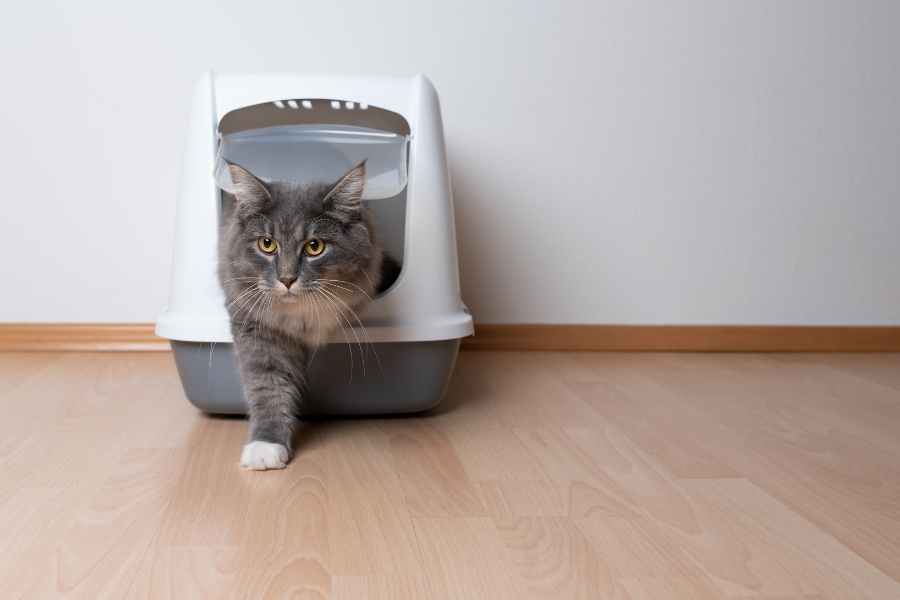
Using a bad choice of litter is no different than giving your cat an excuse (or a good reason) to urinate outside the litter box. Generally, cats care about the type of litter you provide them. For example, if it is natural or synthetic, its texture, and if it has any smell.
Which type of litter does your cat prefer? Does your cat like clumping or non-clumping litter, paper-based or corn-based? Does it prefer scented or non-scented litter?
Most cats like self-clumping, dust-free, and non-scented litter. It also helps if the litter is very fine and tender on the cat’s paws, as large litter particles make the cat uncomfortable when using the litter box.
On the other hand, some cats hate litter that keeps getting stuck in the fur between their paws, which can be uncomfortable. For example, clay-based litter sometimes clumps and sticks to the cat’s feet.
If you are looking for a non-scented litter, consider World’s Best Cat Litter, which lasts a long time, has no smell, and is made with only safe ingredients. Another example is the fine-grain microcrystal litter Ultra Micro Crystals, which has a particle consistency like river sand. It is popular partly because it is easy to use and contains no allergens or odors.
The best way is to try out different types of litter, including wood pellets, walnuts, crystals, and clay-based litter, to see which one your cat likes most. Fortunately, there are many cat litter choices to select from; cat owners only need to find the one that their cat likes to use and stick to it. Examples of cat litter include:
Clay Litter
This is probably the most traditional form of litter, whose use dates back to the early 1900s. Generally, clay litter is cheaper than natural litter but does not last as long as other cat litter.
Corn Litter
It is a type of natural cat litter made of corn. It is probably the most popular because it absorbs urine quickly, clumps easily, and is effective at odor control.
Paper Litter
Paper litter comes in the form of pellets made from recycled paper. Your vet may recommend using paper litter if your cat has recently undergone a medical surgical procedure – it does not contaminate the surgical incisions as they heal. On the downside, paper litter is not self-clumping and cannot be used for a long time.
Silica Litter
This is one of the most modern litter types and uses silica. It is highly absorbent and has few dust particles. Silica litter is not self-clumping, compelling the cat owner to stir the silica litter at least twice a day to enhance the absorption of the urine.
Other types of litter include grass litter, wheat litter, walnut litter, and coconut litter.
Using Cat Attracts
Cat owners can improve the quality of their cat litter by adding the right cat attractants. Cat owners have long reaped many benefits from using cat litter to encourage the cat to use the litter box more frequently; they swear by it. Cat attractants give off a pleasant smell that cats love; it naturally invites the cat to go into the litter box more often.
An example of a clinically tested solution is Dr. Elsey’s Ultra Litter Attractant – it is 99% dust-free, has great texture, contains only natural ingredients, and is blended with an herb attractant to keep your cat interested in the litter box. It is a practical solution to entice your cat to visit the litter box, get comfortable around it, and pee inside.
It is particularly helpful when handling a cat recovering from an illness.
Other cat owners add tiny pieces of Aspen wood shavings to give the cat litter a natural smell (which cats love) and to support the cat’s feet better. The wood type must be selected carefully to protect your cat from skin and respiratory issues.
The Amount Of Litter To Be Used
Ensure your cat’s litter is at least 3 inches (about 7.5 cm) deep to enable the liquid waste to clump together properly and keep urine away from the lower side of the litter tray or box. Also, the right amount of cat litter makes it easy for the cat owner to scoop every day.
The Litter Box
As far as the litter box is concerned, cat owners need to keep these three vital points in mind.
- The number of litter boxes you have in your home
- Having multiple cats in the house means the cat owner must provide sufficient food and water bowls, litter boxes, and resting spaces for all the cats. Otherwise, one of the cats is likely to struggle to carve out a space for itself and therefore start peeing inappropriately.
- Cats get stressed when they have to compete for water, food, and litter boxes with other cats.
Veterinarians recommend providing an extra litter box for each cat, or, at least, n+1 litter boxes, where n is the total number of cats in your home. Some vets recommend n+2 litter boxes, where n is the total number of cats in your home. It helps to always remember that you are dealing with exceptionally territorial animals.
The Design And Color Of The Litter Box
Seemingly trivial, the shape and color of the litter box matter a lot more than most pet cat owners imagine. For example, a litter box with high edges makes it hard for the cat to get in, particularly an overweight or arthritic cat.
Other cats hate going inside a litter box with a lid or covered top to avoid feeling trapped. The litter box should not be too small for the cat. According to experts, the size of the litter box should not be less than 1.5 times the size of your cat. Preferably, it should be like an extra-large, uncovered box that can easily be fitted under the bed and provide enough room for your cat.
The best litter box selection criteria might involve you offering your cat different types of litter boxes so it can find the one it likes the most and stick to it.
Location Of The Litter box
Cats love their privacy, particularly when they need to go to the bathroom. Ensure the litter boxes are placed in quiet, private, and strategic locations for your cat’s convenience.
Maintaining A Clean Litter Box
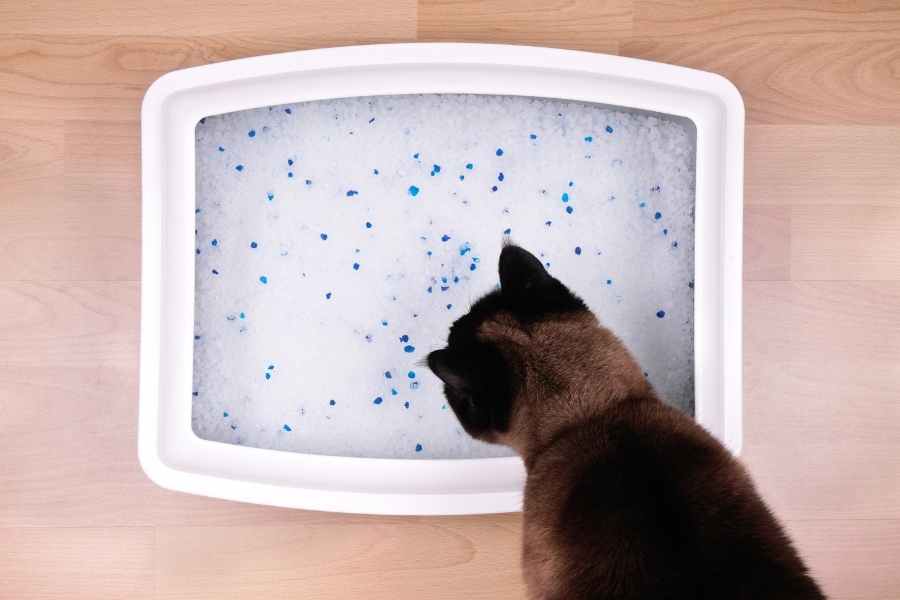
You have to scoop at least once a day and clean the litter box at least once a week. When cleaning the litter box, use only water and ordinary dish soap with no odor to stop the box from catching smells that are repulsive to the cat. Also, stay away from deodorizers or cleansers with odors.
Remember, cats are extremely clean animals and will not use a dirty litter box.
How to Remove Cat Urine Smell
If your cat has soiled a part of your home, like a carpet or wall, you have to clean the urine stain and completely get rid of the cat urine smell. Any lingering pee odor invites the cat to urinate on the area again, and the cycle might never end, unless you clean properly after your pet.
Cat urine contains uric acid, which is not easily washed away with water and ordinary soap. Even after repeatedly washing off the stain using conventional methods, the cat still smells the uric acid/pheromones left on the carpet.
You need to completely disintegrate the urine odor using a biological washing powder or enzyme cleaner to stop the cat from going back to the spot. A biological washing powder is an effective cleaning product as it contains enzymes to break down the pesky components in the urine that attract the cat back to the spot.
An example is Mister Max’s Anti Icky Poo. You have to avoid bleaching products, especially those with ammonia; ammonia attracts the cat to pee on the spot again.
Once you have applied the biological washing powder to the stain, allow it to soak for some time. You may have to scrub the stain to get everything out.
Use a black light to ensure you have eliminated the entire stain. You may have to rip apart the carpet if the urine has soaked into the padding; getting rid of the entire odor is the only sure way to ensure the cat does not urinate in that area again.
You Might Be Interested In Learning How To Get Rid Of Cat Urine From Your Bedding
Other common sources of stress for your pet cat include:
- A family member is visiting you (and probably has a kid who keeps running after the cat).
- Drastic changes in weather or environment
- Bringing a new pet into your home
- Buying a new and noisy home appliance, such as a refrigerator, or
- A noisy construction site near your house has recently started operations.
Ways Of Destressing The Cat
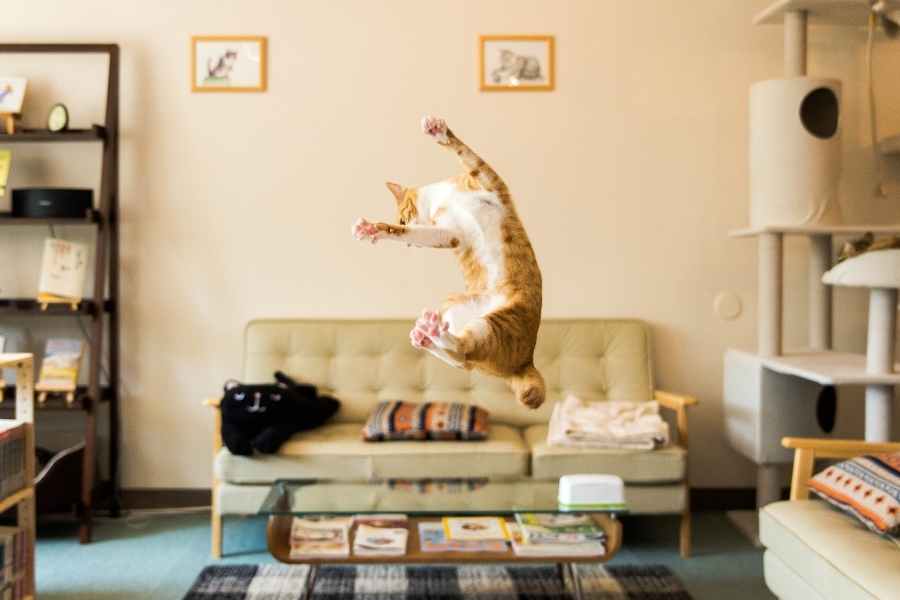
Administering Prozac or Fluoxetine medication to the cat – Ask your veterinarian for advice on the best antidepressants to administer to your cat to help it relax. This treatment has helped many cats stop their urine marking habits. The cat owner is advised to gradually discontinue administration of this drug once treatment has been successful. As an alternative, a veterinarian-prescribed diet might be beneficial.
Placing cat toys, crinkle bags, fish tanks, and scratching posts in strategic places in the house to keep the cat stimulated, playful, and physically active.
Playing with your cat. For example, you could buy a rechargeable laser light to play with your cat in the dark.
Invest in a catio with high shelves and resting perches for the cat to lounge on
It’s worth noting that the longer you wait before dealing with cat urine behavior, the more it becomes engrained and difficult to correct, so get started.
Step #3: How To Discipline A Cat For Peeing Outside The Litter Box
Here are some of the ways to help your cat break the habit of peeing inappropriately:
Come Up With A Fixed Routine For The Cat
It helps to feed or take your cat out for a walk or in the garden at the same time every day. Uneven routines, especially feeding patterns, are likely to cause your cat to pee inappropriately.
Fencing
Consider putting up a fence or a gate with a small pet door. The goal is to block the cat’s access to specific areas in the house.
Relocating the Litter Box
If you notice the cat is peeing in one area of the house, you may move the litter box to that part of the house and gradually shift it back where you want it.
Clicker Training
The goal of clicker training is to alter how the cat uses specific areas of the house by rewarding it with a few treats whenever it does the right thing, like going inside the litter box. It is also called positive reinforcement training, and it seeks to approve and encourage progressive behavior in cats.
That way, the cat can stop urinating in a specific area and start using it for feeding, playing, sleeping, or scratching. The cat owner uses a clicker to make a certain sound when the cat is doing something good and then rewards the cat with a treat like small pieces of chicken or tuna fish.
You just have to reward the cat when you catch it doing something good.
Reverse Psychology Tactics
Consider putting some of the cat’s food and water where it usually pees. Cats are extremely hygienic animals, they tend to avoid peeing where they expect to find food and water. Soon, they started relating that spot to food, not pee.
You may provide the cat with scratching posts and pads; the cat leaves its scent on these surfaces rather than on your bed, couch, or carpet.
Buy a Scatmat Training Mat
You can buy a scatmat mat (PetSafe ScatMat Indoor Pet Training Mat) —a small electrical gadget with a transparent cover to put over the areas you do not like your cat visiting.
The gadget gives the cat small electric shocks when it stands over the prohibited area. The electric shock is mild and only meant to startle the cat without harming it.
Why Is My Male Cat Peeing Everywhere?
You must consider whether the cat is sick. Thereafter, ensure the litter is clean and you scoop at least twice a day. You might need to use pheromone diffusers to keep the cat calm. If it is not neutered, consult a vet for this procedure; data shows a neutered cat is less likely to spray.
Kittens peeing in random places? The causes of inappropriate urination in cats are quite similar. Have the kitten checked by a vet to eliminate the possibility of an illness.
Besides that, develop a routine for your cat and ensure your kitten feels free to use the litter box. Ensure the kitten’s litter box is placed in a private and serene location.
Homemade Cat Pee Repellents: What Smells Deter Cats From Peeing?
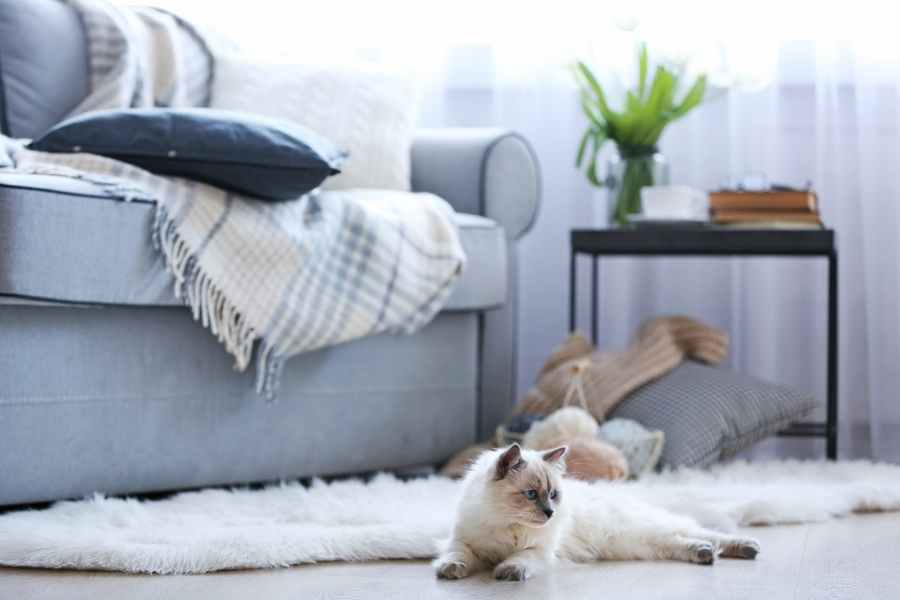
Are you wondering, “How do I stop my cat peeing in the house?” Well, consider using smell repellents. Indeed, you can use your cat’s olfactory senses to effectively repel cats from peeing in your house.
All you have to do is apply the repellent where the cat likes to do its business. A homemade solution of water and vinegar (ratio 1:1) can be used as a spray to stop cats from peeing in houses because of its strong smell.
The best thing about homemade solutions is that they are eco-friendly and affordable; they are safer for you, your kids, pets, and the environment. However, homemade cat pee repellents may not always work, paving the way for more sophisticated commercial products.
Remember to test any cat deterrence solution on a small patch in the low traffic areas of your home to ensure it does not stain your carpet or furniture. Below are some of the homemade solutions you can use to stop cats from spraying or urinating around the house:
1. Vinegar: Does Vinegar Deter Cats From Peeing?
Yes. One of the most common questions we receive from our readers is, “Does vinegar keep cats away?” Due to its strong and pungent odor, vinegar can deter cats from urinating in unwanted spaces in your home.
It contains acetic acid as one of its primary components, which is the source of the strong acidic smell in vinegar.
Many people say vinegar smells like ethanoic acid, and we could not agree more. However, a cat’s olfactory cells are 14 times stronger than those of human beings; you can imagine how horrible the smell would be for cats.
Start by preparing a solution of vinegar and water in a ratio of 1:1 and putting it in a spray bottle, and mist over the affected area. Alternatively, soak a piece of cloth, rag, or sponge in vinegar and place it where the cat likes to pee or poop; ensure the cloth remains wet for maximum effect.
Does apple cider vinegar keep cats away?
Yes. Apple cider vinegar helps repel cats. Begin by preparing a solution of cider vinegar and water in a ratio of 1:1 and placing the solution in a spray bottle.
Next, apply the cider vinegar solution where the cat is fond of peeing, such as on a carpet or couch, by spritzing the solution over the entire section.
Alternatively, you can use ordinary white or malt vinegar in place of apple cider vinegar. Both options also have a strong, pungent smell that cats hate.
Does vinegar deter cats from pooping? Yes. The powerful smell given off by vinegar feels too acidic or pungent for the cat to withstand. Regularly apply a solution of vinegar and water to the areas of the house where your cat poops to fend them off.
2. Citrus Spray To Stop Cats Peeing
Cats do not like the smell of tangerines, limes, grapefruit, oranges, or lemons. Usually, these odors are toxic to cats. To cats, they are acidic and offensive smelling. Therefore, you may place a few orange peelings where the cat likes to pee or poop to deter it and keep it away.
Then again, you can make a lemon-scented spray solution by mixing two cups of water (each containing 473 ml) with two tea spoons of lemon juice.
Also, you can put lime, orange, lemon, and tangerine peels in water, boil the solution for a few minutes, and allow the solution to cool down. Then, transfer the solution to a spray bottle, add a few tea spoons of lemon juice, and shake the solution a little.
Does lemon juice stop cats from peeing? Yes. Cats hate the smell of lemons and other citrus fruits. This is why cat owners are advised to use citrus oils or peels to deter the cat from peeing in certain parts of the house.
Lemons are considered by some cat owners to be one of the best natural deterrent products; you can use lemon peels to keep cats away. You can also use lemon thyme or lemon balm instead of lemon peels. However, ensure you regularly replace them to maintain the required efficacy.
3. Essential Oils To Deter Cats From Peeing

Most essential oils like tea tree, lavender, eucalyptus, citronella, cinnamon oil, lemongrass oil, peppermint oil, etc. are repulsive and toxic to cats and are some of the best examples of essential oils to stop cats from spraying.
Combine one part of essential oils, like lemon or lavender, with three parts of water and stir the solution. Remember to use a glass spray bottle for this work because essential oils wear out faster in plastic bottles.
Will eucalyptus oil deter cats from peeing? – Yes. Instead of using other home-based solutions like vinegar, you can use essential oils such as eucalyptus or peppermint oil to stop your cat from peeing on specific surfaces at home.
Does peppermint oil stop cats from peeing? Yes. However, you must be careful when using peppermint—there are concerns it may cause pneumonia, digestive issues, neurological issues, or liver issues when ingested by your cat.
What Smells Do Cats Hate?
Thyme, lavender, eucalyptus, mustard, marigold, rosemary, cinnamon, strong menthol smells, rue, peppermint, grapefruit, Coleus canina, and pennyrola are some of the smells cats can’t stand.
Cats generally dislike the smells of lemongrass, rosemary, and cinnamon. It is why you are likely to find these products as ingredients in most cat repellents, such as Nature’s Miracle.
Spices That Repel Cats
If you are still wondering, “What scents do cats hate?” Consider using the following spices to repel cats from some housing areas:
- Crushed garlic
- Hot pepper (this is why capsaicin is used to manufacture cat repellents)
- Mint: Similar to spearmint or peppermint, the smell of mint is toxic to cats.
- Thyme is also offensive to cats. It can be used to repel cats, especially when combined with rosemary. Thyme also keeps your house fresh.
- Lavender: Consider planting lavender plants in pots and putting them where the cat likes to pee.
- Coffee: Generally, cats do not like the smell of coffee, mainly because caffeine is toxic to cats. However, coffee contains caffeine, which can be toxic to cats if ingested. The smell of coffee wears out rather quickly, so it must be replaced regularly.
How Do I Stop My Cat From Peeing In The House – Different Areas And Spots of Your House
The best way to stop inappropriate urination in cats is through a combination of methods. This is always done after ascertaining that your cat is not battling an illness.
You need to clean the litter box regularly and scoop at least twice a day. Ensure there are enough litter boxes for the cats in your home. Use deterrent sprays to keep the cat away from some areas of the house. Also, you may use home-based solutions like citrus or vinegar to stop the cat from urinating.
1. How To Stop A Cat Peeing On Carpet
Make sure you thoroughly clean up after your cat to remove any urine pheromones that attract the cat to urinate on the spot. For this, you need the appropriate cleaning agent—an enzymatic product.
In addition, consider applying the appropriate cat repellent to deter the cat from peeing on certain sections of the carpet.
Learn more about cleaning cat litter from your carpet here.
2. How To Stop Your Cat From Peeing On Your Bed
You can use Feliway diffusers in your bedroom to keep the cat calm whenever it is in the room. In addition, keep the litter box clean and in an easily-accessible but private spot in your home or bedroom.
Try placing the cat’s food where it pees to recondition how it interprets the use of your bed or bedroom. Ultimately, you may have to keep the cat completely away from the bedroom or restrict access to specific times.
You Might Also Want To Learn How To Prevent Cat Peeing On Your Bed
3. How to Prevent Your Cat from Peeing on Your Clothes
If possible, avoid leaving clothes on the floor, particularly if you do your laundry using ammonia or chlorine-based cleaning products. The smell of bleach might explain why your cat pees on your laundry.
You might need to consider buying a good laundry basket to hold your clothes. Otherwise, limit your cat’s access to the laundry area.
You can also use cat repellents to keep your cat away from your clothes. Home-based cat repellents like vinegar, citrus, or coffee give off a scent that cats hate and could help keep your cat away from your clothes.
4. Home Remedies To Stop Cats From Peeing On Furniture
Cat owners can cheaply prepare home-based solutions to stop cats from peeing on their furniture or house surfaces. For example, a solution of vinegar and water (at a ratio of 1:1) is an effective homemade cat repellent spray for the furniture in your home.
Also, you can use a suitable mouthwash (like Listerine) to stop cats from peeing on furniture. Here, you need to prepare a solution of water and mouthwash (a ratio of 1:1) and spray it around the areas where your cat likes to pee, preferably at the base of the furniture.
Reapply this solution every three days.
5. How To Stop Cats From Peeing Outside My House
Start by resolving any possible conflict that may exist between your cat and the neighborhood cats. Find ways to get rid of all the cat urine smells in the compound (planting suitable vegetation) and make the outdoor space friendlier for your cat.
Scents from other cats (neighborhood or stray cats) could be making your cat anxious, causing it to spray outside the house.
Also, provide extra litter boxes and use the right type of litter and litter boxes. Ensure you scoop and clean the litter box more frequently to keep the cat interested in using the litter box. It helps to get your cat neutered or spayed to reduce marking or spraying outside the house.
Conclusion: How Do I Stop My Cat From Peeing In The House?
Observation is key to figuring out how to stop a cat from peeing in or out of the house. Medical conditions are a common cause of inappropriate urination, and it is best to consult a vet to rule out this possibility before proceeding with other measures.
Use deductive reasoning to understand your cat’s general behavior, like why it likes to urinate in certain places, and get to the bottom of the cat pee problem at home. Observing your cat’s conduct can help you identify issues that would have cost you plenty of money at the vet when the issue is simply behavioral.
By all means, avoid subjecting the poor cat to any negative reinforcement, which only exacerbates the problem. Instead, look for ways to distress your cat—stress is a major cause of urine marking or inappropriate urination in cats.
Further Reading:
How Do I Stop My Cat From Peeing In The House? A Must-Read For Cat Owners

